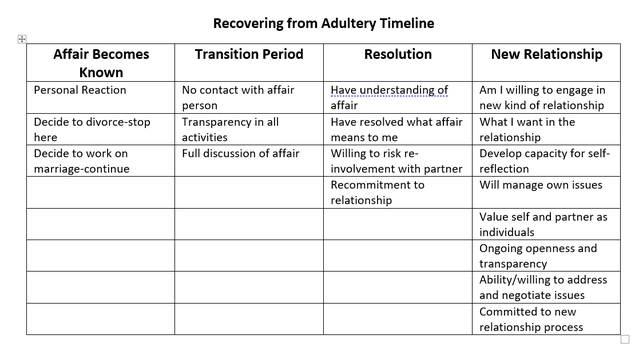Infidelity
Infidelity: Figuring It Out
What does recovery from infidelity look like?
Posted July 31, 2020 Reviewed by Ekua Hagan
We all know that cheating in marriage occurs—this is not news. The statistics about infidelity can be startling (57% of men and 54% of women admit to infidelity, 22% married men and 14% of married women admit to straying at least once, and the average length of an affair is two years).[1] But what is most important is what is happening to you and to your marriage.
As a clinical psychologist who has worked with couples for over 30 years, I know just how difficult it is for individuals to deal with infidelity. I think there are five basic questions that you need to think about when it comes to suspected and/or discovered infidelity by your partner:
- How do you know?
- How do you confront it?
- What damage has been done?
- Do I stay or go?
- How do we establish a new relationship if we want to stay together?
Peggy Vaughn, in her book The Monogamy Myth: A Personal Handbook for Recovering from Affairs, walks you through all the above issues in dealing with an affair.[2] In addition, she does a great job of describing the ways in which society supports infidelity.
I want to talk about two of these issues in this post: (1) figuring out what damage has been done to you and the marriage relationship; and (2) how you can establish a new marital relationship if you decide to stay married.
Dealing With the Pain of Betrayal
The first and most compelling thing to deal with is the pain of the person who has been cheated on feels—the personal sense of betrayal, i.e. the feeling of personal rejection.
While honoring this felt experience, I take a different perspective on what is betrayed. I believe an affair is the betrayal of the relationship rather than the person. This is not what you feel—it feels like a personal rejection of you as a desirable person, as a lovable person, as a valuable person—it feels personal. Esther Perel is a well-regarded couples’ therapist who can help us figure out what feels so personal.[3]
Perel has a unique perspective on why we have such a profound belief in monogamy. In monogamy, we seek the exclusiveness with another person that is like the childhood experience we had of being loved unconditionally without us having to make any effort to win that love. And, we felt we were loved exclusively. Of course, our relationship with our mothers was never exclusive—mother had other relationships—with father and our sibs. The exclusiveness of monogamy feels like a recreation of that early sense of “specialness” we had with mother. It is this sense of “specialness” that is threatened by an affair.
A real challenge to dealing with an affair is coming to grips with the loss of this subconscious, prized sense of "specialness." We can emerge as unique rather than special.
Assessing the Damage
If it is the relationships rather than you personally that has been betrayed, what is the damage done to you? What is the damage done to the relationship? Here are several important things to think about.
- What you thought about the relationship is not true—your relationship has been altered in a way you do not understand.
- Your partner has disinvested in the relationship with you in some way and you have been kept in the dark.
- You have lost connection with someone you love.
The affair and its secrecy have prevented you from making informed decisions about your own welfare. The entire time of the affair, you have been making choices about the things you value in your life without having the information you needed to make sound, thoughtful, and good choices. Your partner discounted this by the choice he/she made to engage in a relationship with another person in secret. He/she has devalued the things that are important in your life.
Another kind of damage is what your thoughts and reactions were to how your partner was acting during the time of the affair. You may have attributed some of these changes to something about yourself—something you did or didn’t do.
The damage done to the adulterer is his/hers to acknowledge and correct—not your job. His/her dishonesty about the affair will be a major issue to deal with if you stay together. Above all, he/she has exposed a character flaw that must be addressed.
What Next? How to Recover From Adultery
You will have a long, difficult path to recover from adultery if you decide to stay in the marriage. It will be imperative to get help not only for guidance on the process but also to have someone else hold you and your spouse accountable.
I want to make a point about which I feel strongly. Affairs are not “caused” by marital dissatisfaction or unhappiness. This is the equivalent of “blaming the victim.” While there may be marital difficulties, the adulterer made the choice to have an affair. Let me point out—your partner could have:
- Confronted you about dissatisfactions with the relationship.
- Sought, even insisted upon, counseling.
- Negotiated a different kind of marriage relationship, one that was more open.
- Could have sought a divorce.
Not good choices...maybe not…but is adultery a “good” choice?
Marital difficulties, if they were and are present, must be addressed, but not in the context of an explanation for the affair. Dealing with what marital issues there are must wait until the issue of the adultery is directly addressed.
The Recovery Process
Here is the timeline of recovery from an affair that I follow when working with my clients.[4] Each segment of the recovery process has several tasks that I have listed that should occur.
The table starts with the time the affair becomes known and follows through the course of recovery. You can readily see that you will need help to go through this process—it will be hard work and you will both need a lot of support. As you work through tasks under developing a "New Relationship," you will encounter and address all the old marital issues. This is the best way to avoid “blaming the victim.”

A New Relationship
The recovery timeline describes several things a new relationship following an affair must consider, starting with asking what each person wants from the relationship. Look at my post on selfishness for a discussion about negotiating these wants. Fundamental to a new relationship will be how to negotiate the things you want, the self-reflection required to negotiate collaboratively, and ongoing openness and transparency between the two of you.
Through this process, you can address old marital problems and concerns, which can lead to a new relationship.
A New View of Infidelity
A new approach to fidelity as you negotiate a new marital relationship will be needed. This approach means that you buy into the idea that monogamy is not a given but a choice you two are making together. It means that monogamy is negotiated collaborative at the beginning of and throughout your marital relationship. This means that fidelity is a matter of conviction rather than convention.
References
1. _____ Statistic Brain. "Infidelity Statistics." https:://www.statisticbrain.com/infidelity-statistics/.
2. Vaughan, Peggy. The Monogamy Myth: A Personal Handbook for Recovering from Affairs. New York: William Morrow Paperbacks, 2003.
3 Perel, Esther. Mating in Captivity: Unlocking Erotic Intelligence. New York: Harper Paperbacks, 2007.
4. Aponte, Psy.d., Cathrine. A Marriage of Equals. Berkeley, CA She Writes Press




